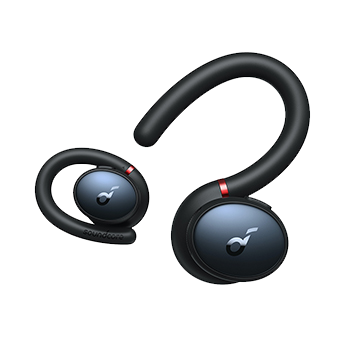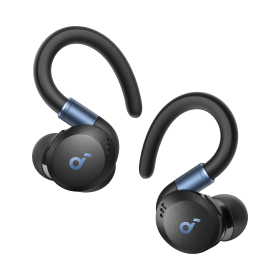Active vs Passive Noise Cancelling Headphones: Which Are Ideal for You?
Noise cancelling headphones allow you to silence the surrounding noise and have some peace and quiet. However, did you know there are two main types? Active and passive noise cancelling are two very different technologies used by headphones to silence the external world.
In this guide, we will delve into the differences of active vs passive noise cancelling headphones, exploring how each type works, and which might be the best fit for your lifestyle and listening preferences. Join us and learn to make a more informed decision.

What Are Active Noise Cancelling Headphones?
Active noise cancelling (ANC) headphones are designed to provide an unparalleled listening experience by actively reducing unwanted ambient sounds. This technology uses built-in microphones and electronic circuitry to detect external noise, creating 'anti-noise' sound waves that are exactly opposite in phase to the unwanted noise. When these anti-noise waves mix with the ambient sounds, they effectively cancel each other out, reducing the overall level of noise that reaches your ears.
The technology behind active noise cancellation headphones is particularly effective against consistent low-frequency sounds, such as the hum of an airplane engine, the rumble of a train, or the drone of traffic, making them a popular choice among travelers and commuters. However, they are continuously evolving and improving, with newer models increasingly capable of diminishing mid-range frequencies, which include most speech sounds.

What Are Passive Noise Cancelling Headphones?
Passive noise cancelling headphones, also known as noise-isolating headphones, rely on physical means to block out external noise. Unlike their active counterparts, these headphones do not use electronics to generate sound waves. Instead, they utilize the materials of the earcups and their fit around your ears to minimize noise penetration
The effectiveness of passive noise cancellation largely depends on how well the headphones fit over your ears. They often feature thick, padded ear cups that cover the entire ear, forming a tight seal that limits the penetration of ambient noise. These headphones are particularly effective at blocking high-frequency sounds and provide a reliable method of noise reduction without the complexity of electronic components.
Active vs Passive Noise Cancelling Headphones: What's the Difference?
When comparing active vs passive noise cancellation headphones, it's important to consider their unique attributes and how these might align with your individual needs. Here's a detailed look at their differences:
Noise Cancellation Effectiveness
- Active Noise Cancelling (ANC) Headphones: Active noise cancelling headphones are best for environments with consistent, low-frequency sounds, such as airplane cabins, buses, or busy offices with background hums. ANC is highly effective because it actively eliminates these noises through advanced sound wave technology.
- Passive Noise Cancelling Headphones: These are more effective against high-frequency sounds like conversations and traffic noises. The passive method relies solely on the physical barrier created by the earcup materials and design to block out noise.
Power Requirements
- ANC Headphones: They require power, usually from batteries, to drive the noise-cancelling technology. This means keeping them charged is essential, especially for frequent travelers or long commutes.
- Passive Headphones: They do not need any power to function. This lack of electronic dependence makes them more reliable in situations where charging is inconvenient, and they are always ready to use.
Cost and Complexity:
- ANC Headphones: Typically more expensive due to their sophisticated technology. They also include components like microphones and electronic circuitry, which add to the cost and may require maintenance.
- Passive Headphones: Generally less expensive and simpler in design, making them a more budget-friendly option without the potential hassle of electronic repairs.
Audio Quality and Additional Noise
- ANC Headphones: The process of creating anti-noise can sometimes introduce a slight hiss when activated, although this is minimal in higher-end models. Additionally, the sound quality can be affected by the ANC process, which some audiophiles may find less pure compared to passive models.
- Passive Headphones: Since there's no electronic processing involved, the audio delivered is often more natural and unaffected by any artifacts of noise cancellation technology.
Weight and Comfort
- ANC Headphones: They tend to be heavier due to the additional components they house. For some users, this can translate to less comfort during extended listening sessions.
- Passive Headphones: Typically lighter, as they lack electronic parts and batteries, which can lead to a more comfortable fit, especially over long periods.
Active Noise Cancellation Headphone Recommendations
Having explored the differences between active and passive noise cancelling headphones, let's delve into some top recommendations for those who prefer the advanced capabilities of ANC headphones:
soundcore Space One Pro

The soundcore Space One Pro features a 4-stage noise cancelling system that actively minimizes background noise using six microphones, an expanded acoustic chamber, high-sensitivity drivers, and an Adaptive ANC 3.0 algorithm.
Its FlexiCurve headband allows for significant portability, folding into five sections at angles of 5-8 degrees, halving the volume compared to its unfolded state. This model also boasts rich, clear sound quality, achieved through triple-composite drivers (PEEK+PU+PEEK), enhancing speaker compliance while keeping distortion under 1%.
soundcore Space Q45

The soundcore Space Q45 is designed to significantly reduce external noise by up to 98%, making it one of the best active noise cancelling headphones. Whether you're indoors, outdoors, commuting, or flying, it automatically adjusts the noise cancellation level to match your setting. You can also select from five levels of noise cancellation via the soundcore app, tailoring the experience to your preferences.
For long travels, the Space Q45 offers up to 50 hours of playback in noise cancelling mode, with a quick charge feature providing 4 hours of playtime after just 5 minutes of charging. Sound clarity is superb, with 40mm drivers utilizing a double-layer diaphragm of silk and ceramic to deliver deep bass and sharp treble. This headphone is designed for maximum comfort, featuring aluminum alloy hinges for durability, a seamless sliding design for a perfect fit, and ultra-soft earcups for extended wear comfort.
FAQ
Is active noise cancelling better for your ears?
Yes, active noise cancelling (ANC) can be better for your ears in environments with consistent background noise, such as airplanes or busy offices. ANC technology works by creating sound waves that cancel out unwanted noise, allowing you to listen to audio at lower volumes. This can reduce the strain on your ears and minimize the risk of hearing damage compared to turning up the volume to overcome background noise.
Is active noise cancelling working during calls?
No, active noise cancelling (ANC) typically does not work during calls. This is because the microphones needed for ANC are used to pick up your voice during the call, which interferes with their ability to detect and cancel out background noise.
How effective is active noise cancellation?
Active noise cancellation (ANC) is highly effective at reducing low-frequency background noises, such as the hum of an airplane engine or the rumble of a train. It can typically reduce noise levels by 25-40dB, which significantly diminishes the perceived volume of noise.
Conclusion
Ultimately, the choice between active vs passive noise cancelling headphones comes down to your individual priorities and the specific noise environment you're trying to escape. While ANC headphones are ideal for frequent travelers, commuters, and those exposed to constant low-frequency noise, PNC headphones are a great option for budget-minded users or those sensitive to pressure. Consider your needs carefully, try out different models, and choose a noise canceling headphone that best aligns with your sound preferences and daily activities.





























































